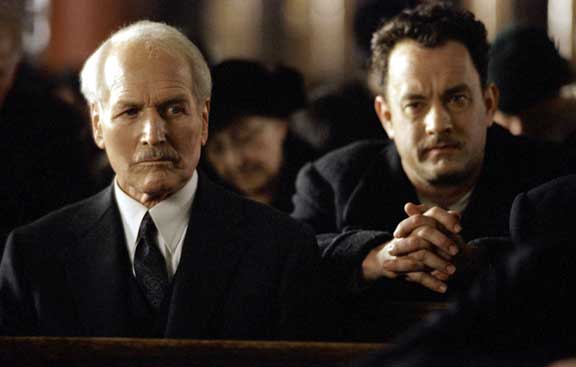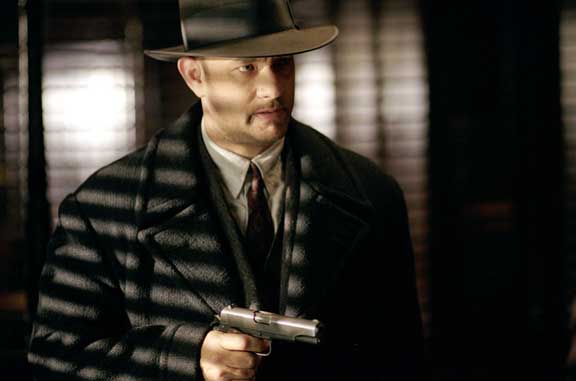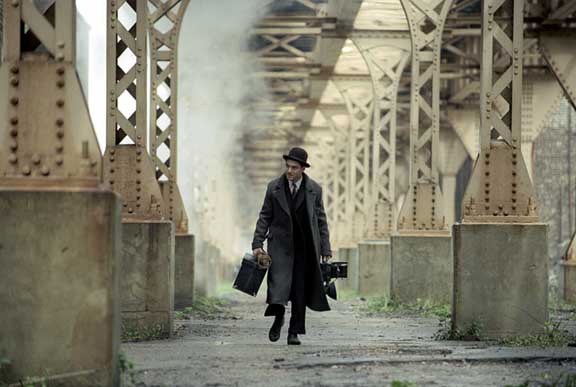Hey, everyone. "Moriarty" here with some Rumblings From The Lab.
per·di·tion (per-dish -en) n. 1. Entire loss; utter destruction; ruin; esp., the utter loss of the soul, or of final happiness in a future state; future misery or eternal death. 2. Loss of diminution. [Obs.] --Shak.
Webster’s Revised Unabridged Dictionary
Sam Mendes has crafted a film of exceptional power his second time out. Working with his amazing returning collaborators like Conrad Hall and Thomas Newman, he has made something special. The remarkable screenplay by David Self takes a powerful Max Allan Collins graphic novel and reimagines it as a burnished memory piece, rich in detail, mood, and graced by some incandescent performance work by the whole cast. ROAD TO PERDITION is the year’s best studio film so far, and a giant step forward for one of the most interesting directors working today.
DreamWorks has taken a chance here, and I hope it pays off for them across the board, both in terms of box-office and awards. I honestly don’t care about those things, but everyone else does, and I’d hate to see this film called a “failure” by any yardstick. This is the type of filmmaking that we ask Hollywood to do more of, and there’s almost a sense of shock that sets in while watching the movie, disbelief that you’re really seeing something so self-assured, so effortless and impressive at the same time. This is not a message movie, aching to be important, and it is no simple revenge picture or gangster story. Instead, it’s an intimate character study, a memory piece. It is a film about fathers and sons and the way that particular love makes us both weak and strong in equal measure. Tom Hanks has decided to expand his palette a bit, but more impressive is the canny supporting work by Paul Newman, who manages to carve an unforgettable character out of a few key sequences, much the same way Jude Law walks away with his scenes thanks to the freakish details of his work. There’s a simplicity to the story told that makes it hard to imagine anyone attacking it.

Well... let me back up a step, actually. Let’s take a look at where this project began. Max Allan Collins and Richard Piers Rayner collaborated on a dark, moody graphic novel a few years back. It was a violent, meticulously researched story about John Looney, his son Connor, and Michael Sullivan, also known as The Angel. Sullivan was the chief enforcer to the Looney Mob, a cold-blooded killer. Some of this actually has roots in fact, as explained in the “Tip Of The Fedora” at the end of the graphic novel. There are a number of big events, set pieces, that are not in the film, and that’s because David Self did not do a direct event-for-event translation of the comic in adapting it to film. Just as Collins took truth and spun his story out of it, Self took the original material and spun something else out of it. Something more austere, less tied to reality. Collins used real people like Frank Nitti, Al Capone, John Looney himself, and Bill Gabel, all of them giving the story an air of authenticity.
Self has changed some character names (Looney has become Rooney now) and created other characters completely (Maguire, played so dazzlingly by Jude Law, didn’t exist in the original). There are events in common, ideas, and the overall emotional pull of the piece is very much the same, but when the Academy is nominating screenwriters next year, Self deserves to be remembered for the exceptional skill and taste he showed in the choices he makes here. His script is a great example of someone giving respect to the original piece even as they feel free to invent and expand in order to make something work as a movie. In Self’s script, it takes 30 pages to finish the opening movement of the film, a beautifully painted portrait of the world that young Michael (Tyler Hoechlin) has grown up in, that he thinks of as home. It’s achingly pretty stuff, and Sam Mendes shows a real skill at creating a sense of community. There’s a wake, thrown by old man Rooney (Newman). Sullivan (Hanks) brings his wife Annie (Jennifer Jason Leigh) and sons Michael and Peter (played by STEPMOM’s Liam Aiken) to pay their respects. Newman is magical in this film, and he comes across as a kindly grandfather to everyone gathered, charming and generous, with a silver tongue almost as sharp as his steel-blue eyes. Mendes cast Newman for iconic power, and he wrings every bit of it out of him, getting maximum value for his effort. In his 20 minutes of film, Newman reminds you what a movie star is capable of, and it’s quiet, textured work, not an empty show-off turn that will be forgotten in time. This stands next to his classic character roles in quality.
Michael is determined to figure out exactly what it is that his father does for Rooney. He knows that Sullivan carries a gun, and when Michael talks to Peter, he talks of “missions” that their father has to go on, painting him as a hero. Michael’s just old enough to know better, though, and it nags at him until he has no choice but to hide in his father’s car and ride along on one of the “missions.” Sullivan is joined by Connor Rooney (Daniel Craig), and they’re supposed to just go talk to someone. Connor loses his temper, though, and things get violent. Even worse, Michael watches it all happen. And here’s where Self does the work that makes the rest of the film possible, where he is most careful in his adaptation. In the original work by Collins, Sullivan was just a goon, the hired muscle of the Looney Mob. He did what he was told, and when his son spies on him, he sees a fairly cold-blooded gangland hit. In the film, Sullivan is a cool customer, poised even when tense, and he only resorts to violence after Connor causes a bad situation to get worse. It’s Connor who is the dangerous aberration, the mad dog. Sullivan acts out of self-preservation, and out of loyalty to Connor’s father. Because we can understand exactly why he does what he does, Sullivan remains sympathetic to us. What he does is wrong... but he’s not played as evil. It’s a fine line that Mendes and Hanks are walking here. If the film softpedals what he does, it risks undercutting its own strengths. You can’t make him a nice guy who just happens to kill people. And at the same time, you can’t make him a stone-cold monster.

In the graphic novel, those first 35 pages are almost all taken up with one incident, the night Michael tags along and spies on his father. In the script, Self has made room for so much more by that point, and he’s given us a sense of just how much Sullivan and his son have to lose. When their world is destroyed, it’s genuinely painful for the audience because of the incredible skill with which that world is painted for us. From that point forward, Self’s film is streamlined, simplified, and better for it. Collins wrote a rousing action story, and in the hands of most studios, this could have been a crowd-pleasing, pulse-pounding action drama like THE UNTOUCHABLES, with big bravura sequences that really brought crowds to their feet. But thankfully, Sam Mendes had something else on his mind, and what he’s made will resonate far deeper because of the restraint that is its primary appeal.
The original work is very much a revenge piece, and the mechanics of that revenge are canny and calculating and cold. The Angel brings his full wrath to bear against the Looney Mob, and it is awesome to behold. Self has streamlined the revenge that Sullivan and his son take, and by focusing it, he’s made the stakes of the film far more personal. Hanks isn’t playing a killing machine here. He doesn’t want to wade through the bodies of footsoldiers. He wants two men, a father and a son, and his relationships with them, and with his son, are the reason to watch this film. Before anything else, the film is concerned with the way that fathers and sons love each other, and how much hope fathers can have, and how much hurts sons can cause, and how much hurt sons can feel, and just how the weight of expectation crushes people and burns love down. Daniel Craig made no impression on me in last year’s TOMB RAIDER, but I remember Lloyd Levin raving to me about Craig. “He’s an amazing performer.” I didn’t understand Lloyd’s ranting until now, and I feel like the last one to get a joke. Daniel Craig is stupefyingly good in this film, and he does it with simple little details. His eyes... his smile... this guy is dead inside, and it shows. It practically leaks out of him, this malaise. He’s got the same diamond blue eyes as Newman, but his are haunted by failure, as weak as Newman’s are strong. In one moment, Newman doesn’t seem to know if he should kill his son or embrace him, and watching him reel under the impact of these powerful waves of emotion is quite affecting.

Newman also plays a really wonderful dynamic with Hanks that is totally different. Sullivan is the son that Rooney wishes he had, honorable and smart and decent. There’s a piano duet between them (actually performed by Hanks and Newman) that is warm and wonderful. Much like in GLADIATOR, seeing that father give that affection away to someone else turns Connor black inside. He’s a weak little man, and the way he acts to protect himself over the course of the film is nauseating. Mendes makes the considered decision to not show Connor kill Annie and Peter. We hear it, but showing it or showing their bodies would have been so visceral, so raw, that it would have overpowered everything we saw after. Mendes is very careful about what violence he actually shows, and how he shows it, because he is fully aware of the impact of those moments. He saves it for the moments when it really matters.
Detailing any of the story after the first thirty minutes or so is a disservice to the unforced, unhurried ease with which the story is laid out, so I’ll tread lightly. For me, a great movie has to have a great supporting cast, and this one does. Dylan Baker manages to make an impression in just a few moments, and Stanley Tucci drops all affectations and comes up with something riveting as Frank Nitti. Certainly the film belongs to Jude Law whenever he is onscreen. He’s brought in to clean up the mess that Connor has made, and he’s an odd bird, both physically and mentally. There’s a joy to what he does, a fascination that makes it more than a job to him. His clothes barely fit right, and his teeth are a ruined mess. Law doesn’t seem interested in being good-looking. Even the way he walks, all flat-footed and graceless, seems to be in complete contrast to the limber physicality of his work as Gigolo Joe. Law seems determined to be a character actor, not a movie star, and we’re richer for it.
Technically, the film is accomplished and beautiful. Conrad Hall is one of the greatest living cinematographers, and his work here should be shown to anyone who wants to argue about whether to shoot in film or on digital media. Hall is a chemist, a magician, and he manages to bend light and color as if by magic. The way he shoots the sheets of powerful black rain or the way he films a roomful of men reading newspapers or the way he shoots the final showdown between Rooney’s men and Sullivan on a cold winter street... it is poetry, sculpted shadow, and would work without a single sound effect or line of dialogue or note of score. Of course, Thomas Newman’s Irish-flavored score is lush and powerful and perfectly complements the visual depth of what Mendes has put together, and the entire sound department deserves special recognition next March because of how beautifully each scene is built, both visually and aurally.
Much of the power of this film comes from the fact that it isn’t needlessly complicated. They didn’t feel they need to inflate it into some sort of “event movie” in order to justify making it. More than anything, this is a case of the right source material in the right screenwriter’s hands with the right director to bring it all to life. This is one of those cases where each decision along the way was exactly right, and the result is alchemy, a rich and rewarding film that will hopefully be embraced by an audience hungry for substance in these summer months.
"Moriarty" out.

